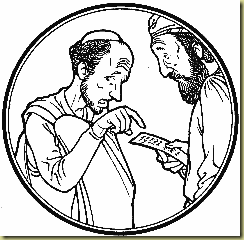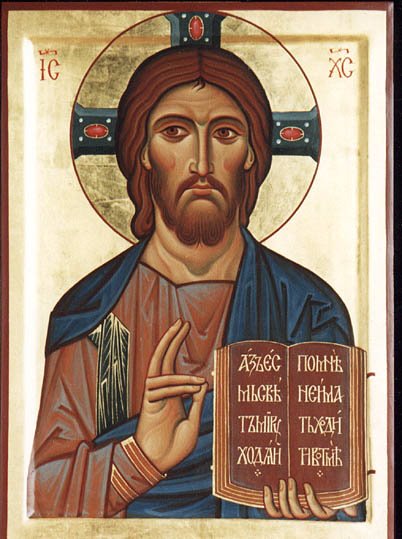Mark 7:31-37; 2 Corinthians 3:4-11; Isaiah 29:17-24
In the Name of the Father and of the + Son and of the Holy Spirit.
Jesus teaches you that it is not what goes into your mouth that defiles you, but it is what comes out of your mouth. For, what comes out of your mouth proceeds from your heart, and this is what defiles you. For, it is out of the abundance of your heart that your mouth speaks, and out of your heart come evil thoughts, murder, adultery, sexual immorality, theft, false witness, and slander. These are what defile you.
As you were when you came into your life, and then, with what you have done with it since, it would have been better that you were born deaf and could not hear, that you were mute and could not speak. For then these evils in your heart would not be unleashed upon the world. But then, also, you would remain alone, isolated, and cut off from family and friends, cut off from life as it was meant to be, unto death and eternal isolation and solitude, which may be the worst hell imaginable.
But, thanks be to God, He did not leave you alone in that state, but having boundless mercy, love, and compassion for you, He visited you in your own flesh and blood and He spoke His creative and life-giving Word into the deadness of your ears. He opened them and He loosed your tongue to speak, not the wickedness of your sin-corrupted heart, but His praise rising from a heart cleansed by His holy blood shed for you, a new heart of flesh to replace your heart of stone.
Jesus’ touch is powerful and healing to be sure, but even the touch of His hands is empowered by His creative and life-giving Word. And so, you need not worry that Jesus hands are not present that He may place His fingers into your ears, that He does not spit and touch your tongue, for you have His creative and life-giving Word, you have His ephphatha spoken to you in and through His holy Word in the Holy Scriptures, and through the lips and mouths, hands and touch of pastors and priests in Law and Gospel preaching, in Holy Baptism, in Holy Absolution, and in Holy Supper. Through these humble means He is present to serve you with greater gifts than hearing and speech, but with the forgiveness of sins, eternal life, and salvation.
“O Lord, open my lips, and my mouth will declare your praise.” The Church sings these words of King David at the beginning of the day in the Matins liturgy. They come from Psalm 51, the great penitential Psalm of David, which he composed after he was brought to repentance through the words of Jonathan. In Psalm 51, King David confessed that he was in need of a new heart, and he asked that the LORD would create a clean heart within him and renew a right spirit within him, words that the Church still sings at each Divine Service in the Offertory. For, along with David, each Christian must confess that he was conceived and born in sin, spiritually deaf to the Word of God and unable to speak His praise until the LORD opens our stopped ears and looses our mute tongues. It is nothing less than an act of creation and a resurrection each and every time a sinner repents. He who was deaf can hear. He who was mute can sing. He who was blind can see. He who was lame can leap like a deer. He who was dead lives, all because of the creative and life-giving Word of a Book spoken into death and nothingness.
You and I need to be cleansed and healed, resurrected, and created anew from the inside out. That good work has already been begun in you, and your LORD will bring it to completion in the day of Jesus Christ. Thus, we are God's children now, yet what we will be has not yet appeared; but we know that when He appears we shall be like Him, because we shall see Him as He is.
What you are now is God’s new creation. God has spoken His ephphatha into you. He has opened your ears to His Word and He has filled you with His Holy Spirit so that you are His temple, free from the bondage of sin and death, free to live life in the Spirit of God, the life of Christ to the glory of God the Father. This is what St. Paul means when he says that “we are not sufficient in ourselves to claim anything as coming from us, but our sufficiency is from God, who has made us competent to be ministers of a new covenant, not of the letter but of the Spirit.” “Such is the confidence we have through Christ toward God,” believing, trusting, and knowing that He has done all things well for us in Christ. No longer is the Law of God cause for fear or a cause for self-righteousness, for Christ has fulfilled it and satisfied it for you, but now you are free to do it without fear of punishment when you fail or misplaced faith in your own works unto death. You are free to serve and love God by serving and loving your neighbor knowing that you cannot lose what has been given to you by grace, and that all that you have is God’s, who gives to you in abundance that you may give from the abundance of your heart what He has given to you: love, mercy, grace, compassion, and forgiveness.
The creative and life-giving Word of God that first clove the darkness in the beginning, that brought forth life out of death and nothingness, that opened deaf ears and blind eyes, that loosed mute tongues still calls out to you, still fills you, still feeds you, still strengthens you, and still re-creates you that you may live and be fruitful in the fruit of the Spirit of God: “love, joy, peace, patience, kindness, goodness, faithfulness, gentleness, self-control. Against such things as these there is no law. But, the desires of the flesh are against the Spirit, and the desires of the Spirit are against the flesh, for these are opposed to each other, to keep you from doing the things you want to do. […] Now the works of the flesh are evident: sexual immorality, impurity, sensuality, idolatry, sorcery, enmity, strife, jealousy, fits of anger, rivalries, dissensions, divisions, envy, drunkenness, orgies, and things like these.” St. Paul warns you that “those who do such things will not inherit the kingdom of God.”
What this means is that, your God, who would not leave you alone in isolation unto sin and death, but in mercy, love, and compassion visited you in your own flesh and blood and spoke His creative and life-giving Word into the deadness of your ears and loosed your tongue to speak His praise, your God also will not leave you or forsake you, he will not give up on you, but continually calls you, again and again, and cares for you to preserve you and keep you that you may remain His child and heir forever. He knows your flesh all too well. He knows your weakness and the temptations you face. Therefore He gives you His Word and His Spirit and He dwells in you and with you, He joins you into a family of faith, the Church, the very body of Christ for mutual support and fellowship to keep you from straying into harmful beliefs and behaviors.
Likewise, you are indeed your brother’s and your neighbor’s keeper. Just as the disciples brought the man who was deaf and mute to Jesus that He might heal him, so too should you share the goodness, love, and forgiveness you have received from Jesus with others. More than that, bring them to the creative and life-giving Word of God in the Holy Scriptures read and preached and the Holy Sacraments which are the very means through which God bestows His gifts of forgiveness, life, and salvation. You are not like Cain, self-centered and a solitary wanderer upon this earth, but you are a member of the body of Christ and the family of faith in Him.
The ears that He has opened, the tongues that He has loosed, they cannot help but hear and speak and sing His Word and His praise. This is who you are – healed sick, raised dead, forgiven sinners, called out of death into life and sent out into the world as salt, leaven, and light that God may be glorified. It is His Word that has called you. It is His Word that has raised you. It is His Word that sustains, empowers, and enlightens you – that makes you a blessing unto others. His Word is your life and your salvation. Read it. Hear it. Eat it. Live it. It is your life, for the life of the world.
In the + Name of Jesus. Amen.




